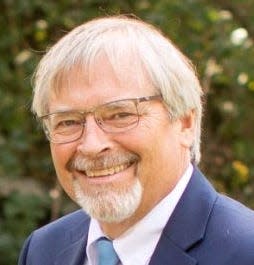Brad Johnson: Expanding Medicaid creates healthier people, hospitals
Better health, stronger hospitals and more vibrant schools and businesses are just a few reasons people should vote yes on Amendment D, which would expand Medicaid in South Dakota.
Nearly all of the state’s medical associations, the South Dakota Municipal League, the Great Plains Tribal Leaders Health Board and AARP South Dakota all are working to ensure passage in November.
By not expanding Medicaid, South Dakota is turning down $328 million in federal funding annually, said Zach Marcus, Campaign Manager for South Dakotans Decide Healthcare.

If Amendment D passes, the state will see $3.5 billion in new economic activity and 4,000 new jobs, he said.
The income cutoff for Medicaid expansion is 138% of the federal poverty level, or $18,754 for a single person and $38,295 for a family of four.
About 43,000 South Dakotans presently are uninsured. Many of these are working but make too much to qualify for existing Medicaid programs but not enough to afford health insurance on the open market. About 14,000 are Native Americans.
Generally, these people must walk into hospital emergency rooms for routine care. In many cases, they are unable to pay for medical services, causing hospitals to write it off in the form of charity care or unpaid accounts.
“The emergency room is the absolutely most expensive place to receive care,” said Paul Macek, interim CEO at Prairie Lakes Healthcare System in Watertown. “Unfortunately, it is the only alternative for the people that would be covered by the Medicaid program. They would have access to a primary care physician as compared to seeking out basic, primary care in the hospital emergency room.”
That causes Prairie Lakes Healthcare System in Watertown to write off between $3.8 million and $4 million annually, Macek said. “If Medicaid expansion was in effect, we would receive about 60% payment from Medicaid,” he said. “That would generate an additional $2.3 to $2.4 million for Prairie Lakes.”
Additional Medicaid revenue would be used for staffing and help absorb inflationary increases.
That revenue is especially important to rural hospitals. Reports say that since 2010 more than 138 rural hospitals have closed and rural hospitals in states that have expanded Medicaid are 62% less likely to lose.
“If you look at the Southeastern states that have not expanded Medicaid,” Macek said, “those are the states that have the highest proportion of rural hospitals that have closed over last five to 10 years.”
South Dakota has “11 rural hospitals that currently are vulnerable to closure,” he said. Losing those hospitals “would be catastrophic for those communities.”
Many people eligible for the expanded Medicaid are “farmers, ranchers, early retirees and a big proportion are people in the 50-65 age group.”
Many of those people are only one accident or illness away from bankruptcy, he said.
Nebraska, which expanded Medicaid in 2020 has seen early success.
“Emerging data shows that the number of state residents without health coverage has plunged, hospitals are feeling less stress on their bottom lines and fewer people are filing for bankruptcy,” a Sept. 25, 2022, Omaha World Herald report said.
Nebraska hospitals wrote off $20 million less in charity care and bankruptcy filings fell by 23.5%.
While offering Medicaid to those in need seems logical, there remain legislators who see sinister things behind the curtain. Some legislative opponents say providing health insurance to people making up to 138% of poverty wages will cause them to decide not to work.
“That’s not what is happening in other states,” Marcus said. “This is really designed so someone can come into the program and then work their way out of it by getting a promotion or finding a different job that provides health care.
“For the most part, people will not be on it indefinitely, nor do we want them to be,” he said.
If voters approve the expansion Wyoming will be the only nearby state that has not expanded. So far, 38 states have expanded the program.
Marcus said, “There are so many reasons to support it: the health of our people, the health of our rural hospitals and clinics and the economic benefits to businesses.”
Brad Johnson is a Watertown businessman and journalist who is active in state and local affairs.
This article originally appeared on Watertown Public Opinion: expanding Medicaid creates healthier people and hospitals
